“That’s kurei,” she said, pointing at a bush laden with clusters of small white flowers.
“Wow!” I exclaimed. I lowered myself to its height and buried my face in one of the clusters. It had a soft scent that was almost completely shrouded by that of the wet earth beneath. I brushed my face lightly against the kurei. An eyelash fell into one of the smooth, virginal petals, drops of water slid out of others.
“Careful! There might be snakes hiding in there,” she grunted. I loved Ala Kaki, but trust her to ruin beautiful moments with needless practicality.
I told her as much.
“Fine, go ahead, just don’t blame me if a dhanda (a breed of snakes) bares its fangs into the nostrils that you’d just buried into that kurei,” she said. The image of poisonous fangs in my nostrils was a hideous but funny image. I burst out laughing, Kaki joined me.
“Isn’t the smell of the earth after rains just lovely?” remarked Kaki, trying to make amends with a stab at poetry. I rolled my eyes and told her as much. She pinched my forearm and laughed loudly when I squealed.
Also read: Mango Sutra, and a Whiff of Nostalgia
“You laugh like Kumbhkaran,” I grumbled.
“Why, thank you, grateful child,” she said.
“Oh, never mind my manners. Look, what is this one called?” I asked, pointing at a plant, from which drooped glorious flowers, their fiery red petals upright, exactly like flames.
“Langali,” she said, smiling at my excitement. And as I advanced to bury my face into one, she added, “I know you’ll say just how unromantic and heedless of beauty I am, but that plant is poisonous.”
“I believe you,” I said, pouting. “But it’s so pretty! Like a flower on fire.”
“Hmm, I think it’s called the flaming lily in English, or something like that,” she said. “Come this way, child.”
There were more langali plants on the way. “They are lovely things, aren’t they?” sighed Kaki. “Back in the days, debt-ridden farmers would swallow its petals to kill themselves. Dread lurks close to beauty.”
I said nothing in response to this morbidly poetic observation and looked up at the sky. It was bathed in golden.
“That bright golden colour is because of the sun’s rays passing through the clouds and then getting reflected off the surface of other clouds. Happens often on rainy afternoons,” explained Kaki. I thought it made no sense, physics wise, but I was too lazy to explain Kaki why, so I just nodded sagely.
“And you know how they describe this colour of the sky in old wives’ Sambalpuri?”
“How?”
“Aakash mul kari hansuche bhuasen enta.”
The sky is smiling, coy as a bride. And I couldn’t help but smile – not in coyness, but in sheer happiness at the charm of the folk simile. I took a mental note of it, to be put to use in one of my imaginary literary creations in the future, and still smiling, slipped my arm into Kaki’s plump one. She freed her arm and placed it on my shoulder instead. A fat drop of water fell on her forehead and coursed past the bridge of her hooked nose.
Also read: ‘Gamak Ghar’ and Remembrance of Things Past
“Oh no, it is raining!” she exclaimed in despair. Before I could finish remarking that it was just a drizzle, the drizzle turned into a downpour.
“So we can’t see the pond and the lilies today!” It was my turn to exclaim in despair.
Kaki was already rushing her portly person back through the supremely squelchy grounds of the woods. I followed her example, albeit with lithe grace – or so I supposed. We were back in the old, dear, dry house in less than ten minutes, cold and drenched.
“We couldn’t see the pond!” I cried, when my Mum appeared on the scene with towels for us.
“She’ll take you there tomorrow,” she said, shaking her head in affectionate disapproval at her sister and myself. She added with infinitesimally more sternness, “And only if it is perfectly sunny!”
“Well, the sky was smiling today, all sunny! Coy as a bride, Mama. You never know with the rain!” I grinned.
Mum ran her hands through my wet hair and ordered the cook to make some pakodas. “Don’t make them too oily, Kodo.”
“And don’t make them too crispy either, Kodo!” I hollered.
We sat on the string cot that dark afternoon and stared at the rain pouring onto the aangan (lawn), onto the tulsi, onto the pots of cactus my dad had carelessly decorated the veranda with, onto the elephant-shaped structure of faded, mutilated stone.
I munched on the pakodas, Kaki launched into a story of a fight between Ganesha and Narada. I fell asleep and dreamt of being a bride.
Featured image credit:I 愚木混株 Cdd20/ Pixabay

